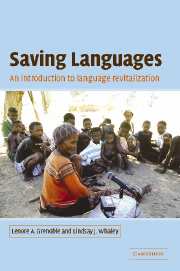5 - Literacy
Published online by Cambridge University Press: 04 December 2009
Summary
Introduction
One of the most complicated issues in language revitalization is literacy. It is often assumed that literacy is a necessary first step in language revitalization programs: developing literacy in a local language can imbue a greater sense of prestige to it; most school-based revitalization programs typically require literacy; literacy in a local language makes it suitable for use in many modern social domains; and so on. At the same time, it has also been argued that literacy can actually facilitate acquisition of a majority language, thereby accelerating the loss of the very language it was instated to protect. Instituting literacy can be very divisive as decisions are made about what the standard form of a language should take, decisions that inevitably promote the use of one dialect over others. Literacy bears a complex relation to other features of culture, and so it usually involves reshaping a non-literate culture to some degree, and it inevitably poses a challenge to the place of oral tradition. It assumes a literate group within a culture who can serve as teachers, and the development of this group requires outside expertise and, possibly, outside funding. These influences add another level of complexity. Such considerations point to the more central issues in language revitalization. Is literacy necessary for revitalization in today's world? What are the potential benefits and what are the potential detriments to a local culture with the introduction of literacy?
- Type
- Chapter
- Information
- Saving LanguagesAn Introduction to Language Revitalization, pp. 102 - 136Publisher: Cambridge University PressPrint publication year: 2005



